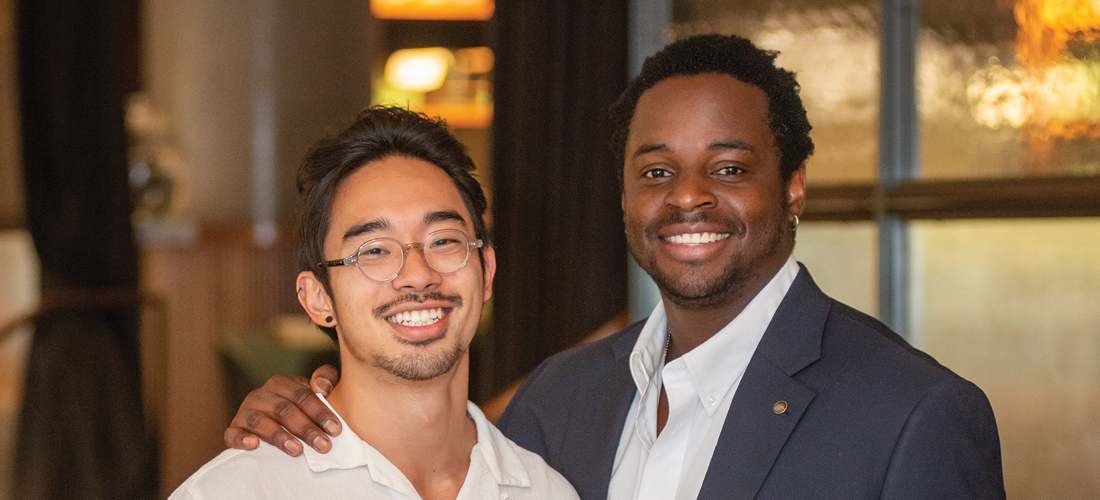
(Photo of Ameelio founders Uzoma Orchingwa, right, and Gabriel Saruhashi by Elevate Photography/ABA Journal)
As Uzoma Orchingwa began studying at Yale Law School in 2017, he kept thinking about the civic dysfunction he witnessed as a child in Nigeria. He also thought about friends he met after his family moved to West Hartford, Connecticut, who ended up being incarcerated as teenagers.
It occurred to him that law alone couldn’t solve problems with mass incarceration and that technology might help bridge the gap.
“There are a lot of predatory companies within the prison space that are making lives very difficult for families when it comes to phone calls or access to quality education,” says Orchingwa, 31, a 2022 graduate of Yale’s joint MBA/JD program. “My idea was to challenge those companies and build an alternative solution that could provide families with completely free communication but also enable them to connect with critical resources they lacked prior to incarceration.”
Orchingwa needed a technical co-founder, and after discovering a group of Yale students who were building technologies for nonprofits, he emailed Gabriel Saruhashi. The Brazilian-born Saruhashi, a double major in computer science and psychology, had worked as a summer intern at Facebook and jumped at the chance to use his skills to help Orchingwa improve the lives of people in prison.
Orchingwa and Saruhashi used their savings to launch the technology nonprofit Ameelio in March 2020. The duo offers families a free mobile app that allows them to send letters into prisons. They since have sent nearly 2 million letters to facilities nationwide, says Orchingwa, Ameelio’s CEO.
They also wanted to break into real-time communications to help families, some of whom pay up to $25 for a 15-minute phone call. They began interviewing formerly and currently incarcerated people and correctional officers to better understand challenges in the system. In June 2021, they launched what they call the nation’s first no-cost prison video calling platform.
In addition to automating the family visitation process, Ameelio’s platform allows prison staff to verify users and monitor and record calls when necessary. It has expanded to include voice calls and messaging and can be used by attorneys for confidential communication.
Prison systems in Iowa, Colorado and Maine, which comprise 35 facilities, are now using Ameelio’s platform. Beth Skinner, the director of the Iowa Department of Corrections, said after the launch that its facilities received video visits from 44 states and 12 countries.
During their research, Orchingwa and Saruhashi found that incarcerated people, particularly those in rural facilities, lack access to educational programming. This problem was amplified during the COVID-19 pandemic, when community college instructors struggled to reach their students during lockdowns, says Saruhashi, 24, who graduated from Yale in 2022. “We saw an opening to invest heavily in the education space because literally, educators were coming to us and saying, ‘I cannot talk to my students; there is no way for me to message them,’” says Saruhashi, Ameelio’s chief technology officer.
Ameelio’s platform not only facilitates virtual learning with video calls and messaging but also provides digital resources that incarcerated people can use to guide their own learning. The tech nonprofit will soon launch this service in prison systems in Mississippi and Rhode Island.
Ameelio has attracted major donors, including Twitter co-founder Jack Dorsey, former eBay CEO Devin Wenig and former Google CEO Eric Schmidt as well as the American Bar Endowment and tech nonprofit accelerator Fast Forward. Orchingwa and Saruhashi, who have a team of 17 employees, aim to expand to all 50 states and into the federal prison system. (In January, President Joe Biden signed the Martha Wright-Reed Just and Reasonable Communications Act of 2022, allowing the Federal Communications Commission to regulate charges for prison communication services.)
They also launched a second company in May called Emerge Career that provides job training to help incarcerated people move into high-demand jobs in the trucking industry after their release. They hope to add health care and manufacturing tracks this year.
Sonja Ebron and Debra Slone of Courtroom5
Uzoma Orchingwa and Gabriel Saruhashi of Ameelio